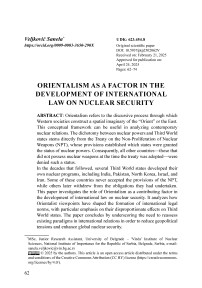Orientalism as a factor in the development of international law on nuclear security
Автор: Sanela Veljković
Журнал: Pravo - teorija i praksa @pravni-fakultet
Рубрика: Articles
Статья в выпуске: 2 vol.42, 2025 года.
Бесплатный доступ
Orientalism refers to the discursive process through which Western societies construct a spatial imaginary of the “Orient” or the East. This conceptual framework can be useful in analyzing contemporary nuclear relations. The dichotomy between nuclear powers and Third World states stems directly from the Treaty on the Non-Proliferation of Nuclear Weapons (NPT), whose provisions established which states were granted the status of nuclear powers. Consequently, all other countries—those that did not possess nuclear weapons at the time the treaty was adopted—were denied such a status. In the decades that followed, several Third World states developed their own nuclear programs, including India, Pakistan, North Korea, Israel, and Iran. Some of these countries never accepted the provisions of the NPT, while others later withdrew from the obligations they had undertaken. This paper investigates the role of Orientalism as a contributing factor in the development of international law on nuclear security. It analyzes how Orientalist viewpoints have shaped the formation of international legal norms, with particular emphasis on their disproportionate effects on Third World states. The paper concludes by underscoring the need to reassess existing paradigms in international relations in order to reduce geopolitical tensions and enhance global nuclear security.
Nuclear orientalism, nuclear weapons, the West, Third World states
Короткий адрес: https://sciup.org/170209487
IDR: 170209487 | УДК: 623.454.8 | DOI: 10.5937/ptp2502062V


